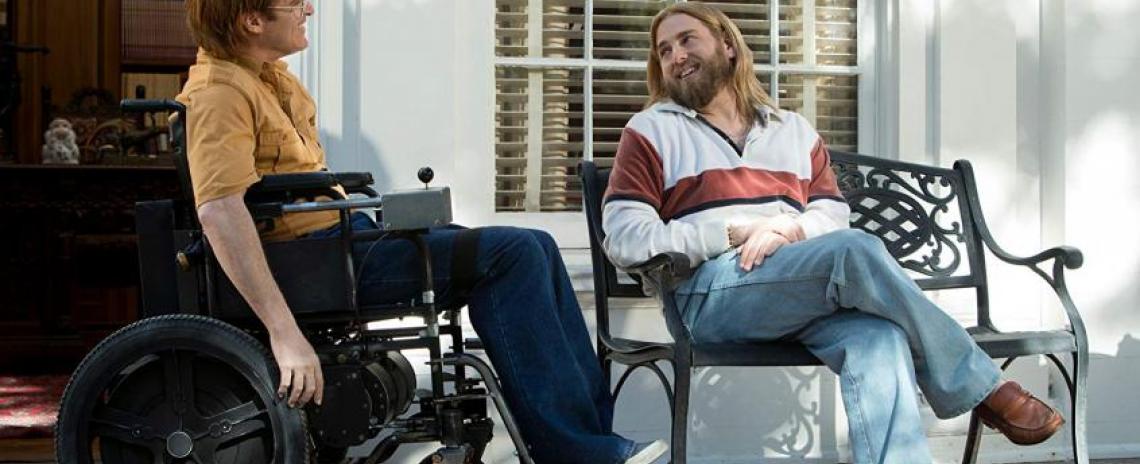Gus Van Sant has always been somewhat of an experimental filmmaker, working both in and just outside of Hollywood. He ascended into the ranks of vital indie filmmakers as a member of the New Queer Cinema movement with features like Mala Noche (1986), Drugstore Cowboy (1989), and My Own Private Idaho (1991). The ecstatic burst of youth in those films, with their playful and knowing interpolation of pop culture, contemporary American literature, and the ’60s and ’70s cinematic New Waves from around the world, eventually gave Van Sant the opportunities to work within the Hollywood system with the Nicole Kidman star-maker To Die For (1995).
His Matt Damon and Ben Affleck-penned Good Will Hunting (1997) would snag its two rising stars screenplay Oscars, as well as a Supporting Actor statuette for Robin Williams in a rare dramatic turn. Good Will Hunting feels experimental only because of its place within Van Sant’s career. It was the filmmaker’s opportunity to helm a tear-jerking, audience-rallying film for adults, one completely bereft of the director’s usual idiosyncrasies. This was exactly one year before the filmmaker would play kid in a candy store with his maligned and misunderstood essay film-slash-remake of Psycho (1998).
Such background isn’t necessary for one to the enjoy the director’s latest feature, Don't Worry, He Won't Get Far on Foot. For all its dark-night-of-the-soul subject matter, the new film is easily digestible. Some Van Sant history does help, however, to pinpoint the odd dissonance at the film’s core: a meeting of the ultra-glossy Hollywood version of the director with his more overtly avant-garde self. Told in a non-linear fashion with occasional dips into the impressionistic, it’s the story of Portland, Ore., cartoonist John Callahan (Joaquin Phoenix) and his journey into sobriety after a car accident leaves him paralyzed from the waist down.
There are gorgeously wrought sequences throughout, as in a moment of clarity when the disembodied head of Callahan’s biological mother (Mireille Enos) asks him to stop drinking. In other scenes, Van Sant utilizes fly-on-the-wall camera movements to document the Alcoholic Anonymous meetings Callahan begins to attend. Interestingly realized scenes like these, including the occasional filmic realizations of Callahan’s crudely drawn and crudely funny cartoons, unfortunately butt up against standard Oscar-bait fare of the Good Will Hunting kind, complete with snot-nosed tearful revelations and confrontations set to orchestral swells.
Before Callahan has his accident, he appears as the specific kind of town weirdo familiar to anyone who grew up in a somewhat tight-knit community: the unknowable “freak” who clearly has a story to tell but elicits such wariness in others that they are too afraid to coax it out of him. What the people around Callahan miss, however, is the humanity at the core of any individual — forgotten, ignored, or otherwise. Joaquin Phoenix, who is arguably the best male actor of his generation, is able to inhabit Callahan in a way that perfectly elicits this paradoxical response of attraction and repulsion. The erratic anguish he expresses in sobering up and learning to live a wheelchair-bound existence is matched later by the joy and giddy possibility of a post-12-step future, which holds both true love and success as a well-known cartoon satirist.
Don’t Worry is stacked to brim with performers who, while are outshined by Phoenix, still fit well within the world of the film. Rooney Mara plays his Swedish flight-attendant girlfriend, Annu. (Thank goodness the film spells out her nationality, as Mara’s accent is indecipherable.) She’s Callahan’s guardian angel, who counters his gruff nature with measured strength and sweetness. Jonah Hill plays Callahan’s AA sponsor, Donnie, who teaches through faith, wit, and stoic charm. Although Hill occasionally struggles to hit the right notes, the music still works. Jack Black crops up as the man driving the car that paralyzes Callahan, and his two scenes seperated by decades telegraph the film’s arc from devil-may-care swagger to melancholic forgiveness. Rounding out the supporting cast is contemporary queer-music icon Beth Ditto, who shows that she deserves a film of her own, and such other rock musicians as indie legend Kim Gordon of Sonic Youth and Portland’s (and Portlandia’s) own Carrie Brownstein of Sleater-Kinney.
Originally developed after Good Will Hunting as a vehicle for the late Robin Williams with Van Sant attached to direct, Don't Worry, He Won't Get Far on Foot feels like the right sort of fodder for the filmmaker’s more Hollywood-leaning side. Unlike his Béla Tarr-inspired “Death Trilogy” of Gerry (2001), Elephant (2002), and Last Days (2005), the film doesn’t represent a new artistic phase for Gus Van Sant, but it’s still a refreshing return to humanistic filmmaking after the major misfires of Promised Land (2012) and The Sea of Trees (2015). Here’s hoping with his next feature the director journeys further back into the distinctive cinema that originally allowed him to make more mainstream films like this.
Rating: C+


